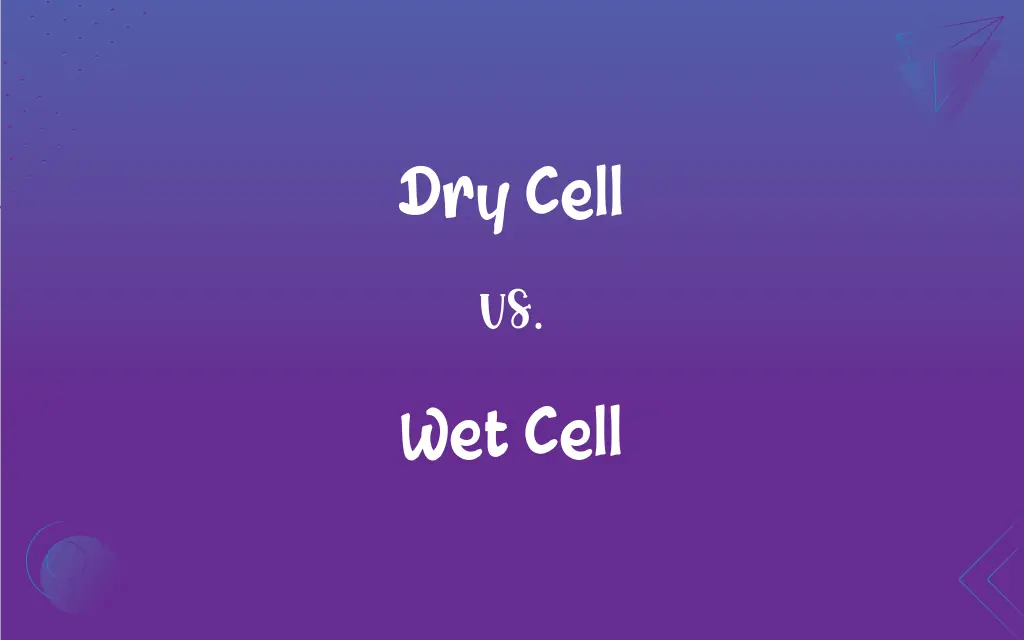Dry Cell vs. Wet Cell: What's the Difference?
Edited by Aimie Carlson || By Janet White || Published on January 8, 2024
A dry cell is an electrochemical cell with a solid or paste-like electrolyte, commonly used in portable devices, while a wet cell contains a liquid electrolyte, often used in larger, stationary applications.

Key Differences
Dry cells and wet cells differ primarily in their electrolyte composition. A dry cell uses a solid or paste-like electrolyte that minimizes spill risks, making it suitable for portable devices like flashlights and remote controls. Conversely, a wet cell contains a liquid electrolyte, often found in car batteries and larger energy storage systems, where mobility is not a primary concern.
In terms of maintenance, dry cells are typically maintenance-free and disposable, designed for convenience and ease of use. Wet cells, however, may require regular maintenance, such as topping off the electrolyte levels, and are often rechargeable, lending themselves to applications where long-term use is desirable.
Safety and storage also distinguish these two cell types. Dry cells are safer to handle and store due to their solid or semi-solid electrolyte, reducing the risk of leaks and spills. Wet cells, with their liquid electrolytes, pose a higher risk of leakage and require careful handling and storage, especially in environments where they may be subject to movement or impact.
The energy density and efficiency of dry and wet cells also vary. Dry cells generally have a lower energy density compared to wet cells, making them less suitable for high-power applications. Wet cells, with their higher energy density, are more efficient for use in situations demanding more substantial power output, such as in vehicles or backup power systems.
The environmental impact and disposability of these cells differ. Dry cells, often containing materials like zinc and manganese, can pose environmental hazards if not disposed of properly. Wet cells, particularly lead-acid types, are more recyclable, but their lead and acid content necessitates careful disposal to avoid environmental harm.
ADVERTISEMENT
Comparison Chart
Electrolyte Type
Solid or paste-like
Liquid
Usage
Portable devices (e.g., flashlights)
Larger, stationary applications (e.g., car batteries)
Maintenance
Generally maintenance-free and disposable
Often requires maintenance and is rechargeable
Safety and Storage
Safer, less risk of leaks
Higher risk of leakage, requires careful handling
Energy Density
Lower energy density
Higher energy density
ADVERTISEMENT
Dry Cell and Wet Cell Definitions
Dry Cell
Dry cells are typically disposable.
After the dry cell in her watch died, she replaced it.
Wet Cell
A wet cell is a battery with a liquid electrolyte.
The car's engine is started using a wet cell battery.
Dry Cell
Dry cells have a lower energy density.
For his camping trip, he chose dry cell-powered lamps for their lightness.
Wet Cell
Wet cells have a higher energy density.
The submarine uses wet cells for their high energy output.
Dry Cell
A dry cell is a battery with a solid or paste electrolyte.
The remote control uses a dry cell for power.
Wet Cell
It's often used in high-power applications.
Industrial machinery often relies on wet cell batteries for operation.
Dry Cell
It's commonly used in small, portable devices.
Most household flashlights are powered by dry cells.
Wet Cell
They require more maintenance and careful handling.
He regularly checked the electrolyte levels in the wet cells.
Dry Cell
They are safer and less prone to leaking.
He preferred dry cells in his devices for their safety.
Wet Cell
Wet cells are typically rechargeable.
The wet cell in her solar system stores energy efficiently.
FAQs
What is a wet cell?
A battery with a liquid electrolyte.
What is a key benefit of wet cells?
Higher energy density for more power-intensive applications.
Are wet cells rechargeable?
Yes, many are designed to be rechargeable.
Where are wet cells commonly used?
In cars, industrial machinery, and stationary power systems.
Can dry cells leak?
They have a lower risk of leakage due to their solid electrolyte.
What is a dry cell?
A battery with a solid or paste-like electrolyte.
Are dry cells rechargeable?
Typically, they are not rechargeable.
What are common uses of dry cells?
Portable devices like flashlights and remotes.
What is the main advantage of dry cells?
Their convenience and safety for portable use.
Do dry cells work well in high-power devices?
They are less suitable for high-power needs due to lower energy density.
Can wet cells be used in small devices?
They are generally too large and require more maintenance for small devices.
What kinds of electrolytes are in wet cells?
Typically sulfuric acid or similar liquid electrolytes.
Why might someone choose a wet cell over a dry cell?
For applications requiring more power and rechargeability.
What's the lifespan of a typical dry cell?
It varies, but they generally have a shorter lifespan than wet cells.
Are dry cells heavy?
They are lighter than wet cells, making them ideal for portable devices.
Do wet cells require maintenance?
Yes, they often need regular maintenance.
How long do wet cells last?
With proper maintenance, they can last several years.
Are dry cells environmentally friendly?
They can pose environmental hazards if not disposed of properly.
How are wet cells disposed of?
They require careful disposal due to their lead and acid content.
What types of electrolytes are used in dry cells?
Commonly zinc or alkaline-based.
About Author
Written by
Janet WhiteJanet White has been an esteemed writer and blogger for Difference Wiki. Holding a Master's degree in Science and Medical Journalism from the prestigious Boston University, she has consistently demonstrated her expertise and passion for her field. When she's not immersed in her work, Janet relishes her time exercising, delving into a good book, and cherishing moments with friends and family.
Edited by
Aimie CarlsonAimie Carlson, holding a master's degree in English literature, is a fervent English language enthusiast. She lends her writing talents to Difference Wiki, a prominent website that specializes in comparisons, offering readers insightful analyses that both captivate and inform.






































































